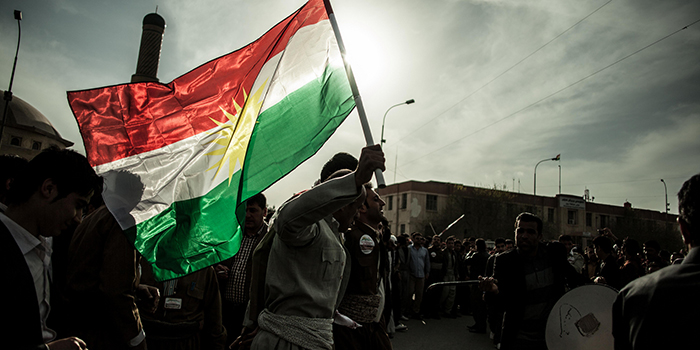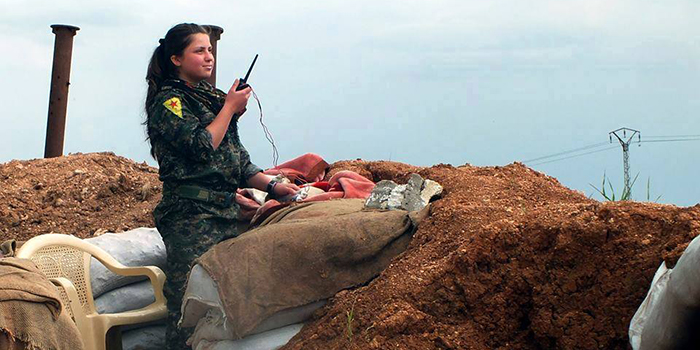by Serhun Al

US Senator Rand Paul (R) recently stated that Kurds should be given their own country rather than simply being armed by the United States. US Vice President Joe Biden, on the other hand, praised Iraq’s territorial unity. Today, while an independent Kurdish state is the dream of many—especially the Kurds of Iraq—it is also the fear of many others in the Middle East. Reconciliation of these two incompatible goals is less likely unless stable democratic institutions and peaceful deliberative culture are established both within different Kurdish communities across Turkey, Iran, Iraq, and Syria on the one hand and non-Kurdish communities in the region on the other.
In Iraq, the number of Kurds who define themselves as Iraqis has fluctuated between 5 and 20 percent between 2004 and 2013. This means that a potential referendum on an independent Iraqi Kurdistan is most likely to result in favour of secession. In full awareness of this fact, Baghdad fears and opposes Kurdish independence especially on the basis of its red lines, such as the future fate of Kirkuk and oil shares. However, the threat of the Islamic State, Baghdad and Erbil’s common security threat, seems to have forced their political confrontations aside, at least for the time being.
On the other hand, in Turkey, the idea of national belonging is much stronger among Kurds, where the quest for independence is very marginal. Hence, almost 60% of the Turkish public in general, and almost 85% of Turkish Kurds, support the recent peace process between the current government and the Kurdistan Workers’ Party (PKK) despite tensions in the recent general election campaign process. Yet, in another recent survey conducted by Kadir Has University, almost 50% of the public still believes that Turkey is under threat of secession. The recent increase of Kurdish control in northern Syria by the Democratic Union Party (PYD), often affiliated with the Kurdistan Workers’ Party (PKK), leads to the fear of spillover effect in Turkey. Fear of the nationalist spillover was the case for decades with the question of Kurdish autonomy in Iraq, but Turkey’s strategic and economic alliance with the Barzani administration in recent years has soothed this public fear and the insecurity of the Turkish state. Turkey’s strategy of incorporating the Kurds rather than excluding them from the national community could prevent a potentially viable secession in the future. The PKK has also gradually come to the conclusion that radical democratisation of Turkey, such as through non-ethnic decentralisation (known as democratic autonomy) rather than an independent Kurdish state, would be a better solution for the Turkish Kurds. Based on this vision, Turkey’s pro-Kurdish Peoples’ Democracy Party (HDP) has started its 2015 general election campaign on the basis of Türkiyelileşme (being from and integrating into Turkey) rather than simply promoting Kurdish rights.

In Syria, the PYD has become more powerful than ever, especially after the recent defeat of the Islamic State in the city of Kobane. The PYD has also firmly stated that the unity of Syria, along with its territorial integrity, is a priority for the party on the condition of democratic autonomy. In fact, the main distinction between the PYD-PKK mindset and the Iraqi Kurds is that while Iraqi Kurds believe that Kurds historically suffered because they did not have their own nation-state, the PKK-PYD wing believes that Kurds suffered because of the nation-state system itself. This is why secession for the PKK-PYD is a less feasible option than for the Iraqi Kurds.
Secession seems to be a more likely possibility for Iraqi Kurds. However, the more important question that presents itself is whether this can be achieved peacefully, which eventually would establish what scholars of conflict studies call, positive peace, i.e. restoration of non-antagonistic relationships across ethnic and sectarian identities. Thus, it is crucial to identify the conditions under which secession would occur peacefully. Kurdistan is neither Scotland nor Catalonia, especially with regards to the relationship between democracy and secessionism. Secession in the Western European context is much more conducive for offsetting the fears and the dreams of different groups due to the democratic means available such as referendums and respect of the results of such mechanisms by states and the public alike. However, secession without such democratic means is more likely to transform contentious dynamics into potential civil wars and deeper inter-ethnic conflicts. Debating the Kurdish state within this context may be more realistic for those who sincerely seek peace, stability, and order in the Middle East. For instance, despite on and off crisis moments, one of the most overlooked dimensions of the peace process in Turkey is the idea of debate among clashing actors. It is still not clear whether this process would lead to the desired outcome, but the ability to build a deliberative relationship after decades of bloody violence is already a positive gain.
If the Kurdish question in the Middle East entails a peaceful solution, it should not be only through negative peace, i.e. the absence of violence, but rather it significantly requires positive peace for a more sustainable outcome. One way of achieving this might be prioritising deliberative democratic culture and its institutions by all conflicting sides. If this can be achieved, secession, in and of itself, will no longer be a matter of contention in the first place.
 Serhun Al has recently earned his PhD in political science from the University of Utah. His research interests include ethnicity and nationalism, social movements and security studies. His recent academic articles have appeared in journals such as Ethnopolitics, Globalizations, and Studies in Ethnicity and Nationalism. He tweets at @SerhunAl.
Serhun Al has recently earned his PhD in political science from the University of Utah. His research interests include ethnicity and nationalism, social movements and security studies. His recent academic articles have appeared in journals such as Ethnopolitics, Globalizations, and Studies in Ethnicity and Nationalism. He tweets at @SerhunAl.





